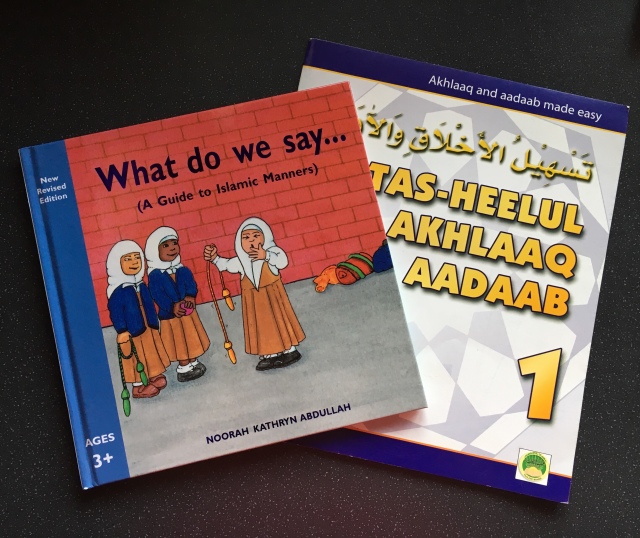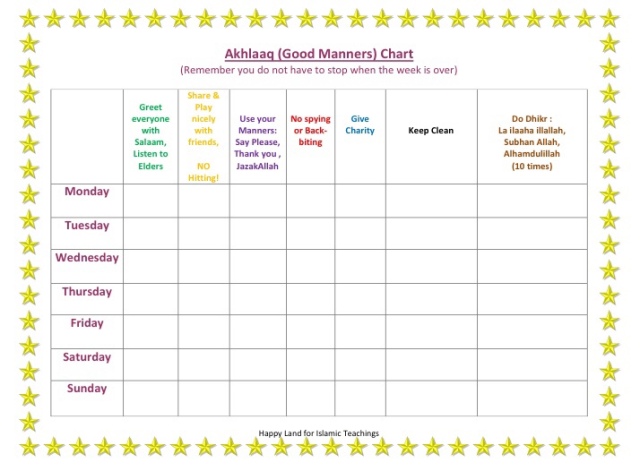Umar Ibn Al Khattab (RA) once said: “Invite people to Islam even without words.” He was questioned, “How?” to which he replied “With your Manners.” This highlights the importance of perfecting ones akhlaaq (character) and adaab (manners) to such an extent that they become pleasing externally to those around you and they are naturally attracted to your presence. Imam Ali (RA) summarised this perfectly when he said: “Live amongst people in such a manner that if you die they weep over you and if you are alive they crave for your company.” We live in increasingly turbulent times where misconceptions of Islam are prevalent. Imam Ghazali (rahimullah) professed that:”Half of disbelief in Allah in the world is caused by people who make religion look ugly due to their bad conduct and ignorance.” Having good manners and character are the simplest and most effective ways of counteracting negativities about Islam and Muslims and presenting our religion to the world in a positive light.
Akhlaaq relates to the internal state of the soul and entails knowledge which enables differentiation between right and wrong and thus sound morals and character. It includes aspects concerning egoism, arrogance, greed and lust. Adaab on the other hand is a more physical state and can be loosely defined as the appropriate action, attitude and response in any given situation. Therefore taking into account expressed manners and behaviour. It includes being respectful to elders, loving and compassionate to the young, maintaining family ties and being honest. The two are very close in meaning and significance and the Prophet Muhammad ﷺ said: “Those who are most beloved to me and closest to me in the Hereafter are those who have the best akhlaaq amongst you.”
For a child this is even more integral in the early years. From birth until the age of seven they are like sponges, absorbing the world around them and it is imperative that we inculcate good akhlaaq and adaab during this phase of growth. As they form their unique personalities – these distinctive, individual characteristics will not only leave a lasting life-long impression on their interactions and progression in the dunya (world) but also a more eternal impact on their affairs and state in the akhirah (Hereafter). Ibn Qayyim (rahimullah) described the importance of good manners in a profound statement: “The entire deen (religion) is about good character, so whoever exceeds you in good character has exceeded you in religion.”
Our Prophet Muhammad ﷺ emphasised that: “No father can give his child anything better than good manners.” Parents, especially mothers are considered a child’s first school and it is the right of the child to be given a sound education amongst other things. As mentioned previously academic education begins from the age of seven but prior to this nurturing encompasses instilling good manners and character within the child; love for Allah and the Prophet Muhammad ﷺ. A mother will undoubtedly be the most influential person in shaping a child’s personality. It is certainly a very heavy responsibility and one which comes with equally heavy rewards. The Prophet Muhammad ﷺ said “On the Day of Judgement there will be nothing heavier on the scales of a believer than good manners.”

The Prophet Muhammad ﷺ said, “I have only been sent to perfect good manners.” Being a mother of four children, all aged 5 and under, this Hadith made me think deeply. The word ‘only’ placed great importance on implementing manners and character within my own Little Muslims. I have been using the book ‘What do we say?‘ to reinforce daily etiquettes that we use in our day such as ‘Bismillah’ when starting something and ‘Alhamdulillah’ upon sneezing. It is quite interactive with its questioning style and allows room for the children to participate by answering. We have used it in conjunction with ‘Tasheelul akhlaq wal adaab’ which is from a more lesson based series of books and focuses on particular scenarios, i.e. manners within the classroom. It contains a story and message which my children struggled to sit through in its entirety due to their ages. Nevertheless it was a useful supplement to get them thinking and will be more applicable to those with slightly older children.
I have used the Akhlaaq chart below with my children as a reward system to motivate and manifest the good manners and behaviour I would like to see in them. This acts as a visual representation of the desired characteristics which can then be promoted during the course of the week and rewarded with treats or appropriate prizes should they be displayed consistently. This is positively reinforcing the behaviour that you want to display and is one of the best ways to get younger children involved and listening.
 In conclusion, as parents we need to recognise that we have been entrusted with the great responsibility of nurturing and guiding our children to fulfil their primary goal of knowing and obeying Allah. We should remember that in doing so both their good and bad deeds will be attributed to us and we will have a share in them. Therefore we should take this matter very seriously. May Allah make it an easy affair for us. Ameen.
In conclusion, as parents we need to recognise that we have been entrusted with the great responsibility of nurturing and guiding our children to fulfil their primary goal of knowing and obeying Allah. We should remember that in doing so both their good and bad deeds will be attributed to us and we will have a share in them. Therefore we should take this matter very seriously. May Allah make it an easy affair for us. Ameen.
Lastly, I would like to leave you with the timeless advice of Luqman (AS) to his son which was captured in the Quran – Surah Luqman (Verses 13-19). This is a separate topic for reflection in its own right but I feel it is relevant at this point to contemplate its message and see whether we are equipping our children with similar advice at this present time.
13. And (remember) when Luqman said to his son when he was advising him: O my son! Join not in worship others with Allah. Verily! Joining others in worship with Allah is a great Zulm (wrong) indeed.
14. And We have enjoined on man (to be dutiful and good) to his parents. His mother bore him in weakness upon weakness and hardship upon hardship, and his weaning is in two years. Give thanks to Me and to your parents, unto Me is the final destination.
15. But if they (both) strive with you to make you join in worship with Me others that of which you have no knowledge, then obey them not, but behave with them in the world kindly, and follow the path of him who turns to Me in repentance and in obedience. Then to Me will be your return, and I shall tell you what you used to do.
16. O my son! If it be (anything) equal to the weight of a grain of mustard seed, and though it be in a rock, or in the heavens or in the earth, Allah will bring it forth. Verily, Allah is Subtle (in bringing out that grain), Well-Aware (of its place).
17. O my son! Perform prayer, enjoin good and forbid evil and bear with patience whatever befalls you. Verily! These are some of the important commandments ordered by Allah with no exemption.
18. And turn not your face away from men with pride, nor walk in insolence through the earth. Verily, Allah likes not each arrogant boaster.
19. And be moderate in your walking, and lower your voice. Verily, the harshest of all voices is the voice of the ass.
And finally – Any good within this post is from Allah the Most High and any mistakes are from myself. May He forgive and accept it from me. Ameen.

